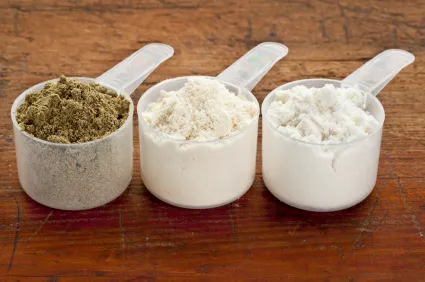
So what’s the story on protein powder?
Reading on this site, I see, under “Eating for a Healthy Pregnancy”, under the Foods to Avoid list is
- Processed protein. This includes protein powders and special protein bars. It is best to avoid all processed, canned, and boxed foods…. And
- Sugary sweets, white flour, and sweet liquids (even fruit smoothies with protein powder) are absorbed quickly by the body and rapidly raise your blood sugar level, which prompts your body to produce insulin to reduce the elevated blood sugar.
Yet on several pages, primarily related to the Your Fitness series, I am recommending protein powders, yes that’s true. Let’s go over the two sides of the question
The dangers in protein powders are potential dangers:
- Eating high protein without fat contributes to nutritional imbalances at best and serious nutritional deficiencies at the worst.
- Some protein powders are produced using extremely high heat sources, causing alterations and potentially damage to the protein structure. This point is controversial
- Some protein powders are made from soy (never a good idea, for so many reasons), or other legumes, or whey from non-organic dairy sources.
- Some protein powders additionally contain legitimately toxic ingredients: non-caloric sweeteners (aspartame, etc.), carcinogens (cadmium, arsenic, etc. as detailed here.
- Liquid meals are an insulin-promoting (fat-storing) poor substitute for real food.
So, the clear answer to avoiding the dangers listed above is to limit protein powders to the post-workout period (when #5 doesn’t apply), to include some fat in your recipe and to use only the highest quality protein powders, where the production methods take into account the concerns listed above. Additionally, certain people need to rely on liquid meals for medical reasons, and they particularly should pay close attention to the recipe of their protein drinks and the quality of the protein powder selected.
Ideally the protein content comes from whey that started in the organic milk of grass-fed cows. Whey is preferable as a protein source for its remarkable ability to help repair muscle damaged or stressed during exercise and as a potent raw material for glutathione production; glutathione is the most potent anti-oxidant we make naturally in our bodies. You’d like whey that has been processed with maximal respect for the fragile components of the valuable whey.
For the best quality whey protein powder, you will pay approximately $2-2.50 per serving. Acceptable products include Dr Mercola’s Miracle Whey and Integrative Therapeutics Whey Protein. I carry what might be the highest quality protein powder, which I would recommend particularly if you have any health concerns or you are pairing fitness (intense workouts) with healing any health challenges. Designs for Health Whey Cool protein powder relies on a proprietary method to extract the whey and produce a powder containing a non- or minimally-denatured protein.
To wrap it up, who needs a protein powder? I recommend protein powders to three groups of my patients. First, athletes who are interested in building muscle make a wise choice when they follow exercise with some form of whey protein: either dairy products or whey protein powder made into a liquid to drink. Secondly I recommend that folks who are troubled by unwanted weight loss to supplement with a protein- and fat-rich smoothie, using whey protein to enhance muscle strength and fats to promote absorption. Finally, when I have a patient who is relying on some sort of tube feeding (jaw surgery, absent gag reflex, or other reasons), we come up with a liquid recipe that frees them from the need to rely on commercially produced liquid supplements, such as Ensure, that are laden with chemicals and sugars and do not contribute to a health diet!

